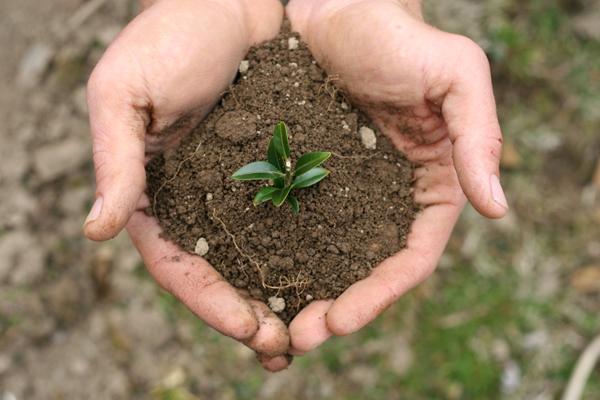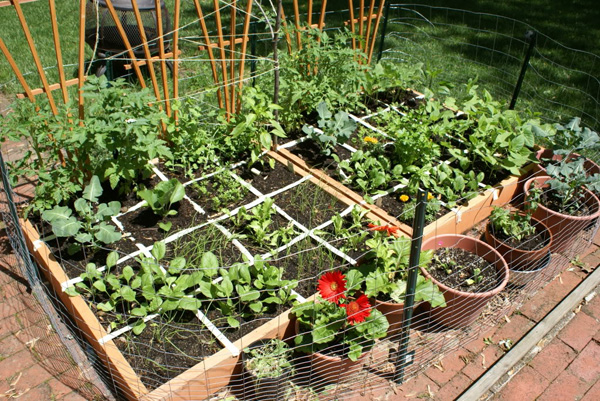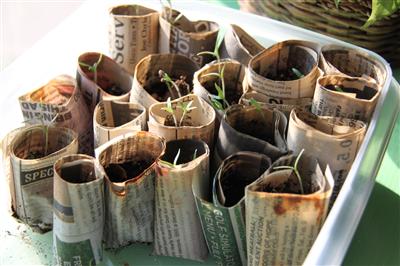
Spring is here and so is the urge to reconnect with Mother Nature by playing in the dirt. Spring vegetables can still go in. Delay the planting of summer vegetables until April 15 or after. That day, in addition to being the day that taxes are due, is also the day of the last expected frost in this area.
I had put some cool weather vegetables in during the fall. As a garden experiment, I covered some with a light layer of straw. I surrounded another group with straw bales and covered them with an old windowpane. They both survived, although it was questionable at times if the ones out in the garden covered with straw would. Production through the winter was lean, but in February and March the protected plants grew quickly and had a lot of edible greenery. The straw-covered ones were straggly, with little greenery. They were just struggling to survive. They are both bolting now. I would do the straw and window protection, also known as a cold frame, again.
If you are putting a garden in for the first time or improving an existing one, try for deep, loamy soil. Say what? After all, we are in Middle Tennessee with clay soils and plates of rock just under the surface. If it is only clay soil that is your problem, just amend it by adding humus and sand. I have used peat moss, perlite and vermiculite. The goal is to get soil that is medium textured, contains organic matter and is well drained. Of course, you can construct raised beds. Do not use creosote on the wood. Sadly, we learned this the hard way. The creosote on the arbor leached into the grapes’ roots and killed them all.
Consider the soil test. That will tell you what nutrients are missing or low and how much of a fertilizer is needed. Poor fertility and low pH are reasons for too little produce. Does your soil need lime, nutrition, texture?
The garden needs a minimum of six hours of sunlight each day. If you have a slight slope facing south, super. Use it. These spaces warm up sooner and the slope is ideal for drainage. Rows would run across the slope, not up and down, a configuration that prompts erosion. Keep your water source in mind. Gardens that are closer to the home are easier to maintain and can be watered within a hose length of the faucet. Think of soil as the living space of the living roots of your vegetable producers. As their keeper, the gardener is responsible for keeping their needs met. You get to reap the benefits of your efforts.

Example of a square foot garden.
Will you be rotating plants or practicing square-foot gardening? Have you considered container gardening? Those with limited space have been productive by using this technique. How about lasagna gardening? Have you tried companion planting? The Rutherford County Farmers Market has educational programs every Tuesday and Friday when the Market is open. Opening day at the Lane Agri-Park this year is May 11. Many of those classes can be found on their YouTube channel and offer guidance on many topics.
High-quality, healthy transplants can be produced only from high-quality seed that is disease-free. If you are buying seed, select the variety that serves your interest. Look at the details, such as the space needed, the size of the fruit produced, the days to maturation. Is it a variety that freezes well? What other details are you needing?
Seed packets should state the year the seed is intended for use. Some seeds stored in a cool place will germinate and produce for several years after the year stamped, but expect poorer results with each passing year. As a reminder, only use seed saved from non-hybrid plants. Plants from hybrids do not grow the same and very often are sterile, never producing fruit. Know your seed source.
You do want to use a disease-free growing medium and clean pots. Growing medium should consist of one-third sand, one-third peat and one-third rich, loamy soil. The scientists and ag experts will tell you to sterilize the soil to ensure that it is free of contaminants and diseases. To do that, bake the soil mixture in a low oven (about 180 degrees) for 30 minutes in a shallow pan. Kill contaminants on the reused pots with a solution is 9 parts water to one part bleach. Rinse at least three times, as bleach residue can kill seedlings. Bleach is toxic, so protect yourself, too. Do not breathe the fumes, and wear gloves while using it. An easy pot solution is to make individual seedling pots from newspapers. They decompose into the soil as the plant grows.

Seed cups made from pages of the Murfreesboro Pulse
Vine crops need to be seeded directly into the pot that will be planted into the soil. They do not transplant well. Use newspaper or fibrous pots for those seeds. Many seedlings can be transplanted into larger pots that they can stay in for the complete growing season.
If you decide to buy your seedlings, here is the opportunity to ask your local nursery about their practices and the practices of their suppliers and the products that they carry. Then, of course, you would have to trust your nurseryman. Go with reputable people.
Before you use or select a plant grown with any fertilizer, chemical, or pesticide, do your research. What do you know about that product? If you are buying it for use, first, read the label. What is its purpose? What do the supporters and detractors say about it? Second, read the directions. More is not better. More can be a killer or a poison. Be responsible for its usage and storage. Thirdly, do you need it or is it routine application?
Remember, you are what you eat. Select wisely.
Upcoming Events
Adventures in Agriculture Festival – This year’s Adventure in Agriculture is held on April 14 from 10 a.m. until 2 p.m. at the Lane Agri-Park on John Rice Boulevard in Murfreesboro. It is a free, family-friendly event with hands-on activities, livestock, trolley rides, horse events and many opportunities through fun learning for adults and children.
Plant and Seed Swap – The Master Gardeners of Rutherford County are organizing the free, family-friendly, community plant and seed swap on Saturday, April 21 from 10 a.m.–noon. This event is open to the public and will also be held at the Lane Agri-Park Community Center, 315 John Rice Blvd., Murfreesboro. The rules for participation are simple: for each one you bring, you take one. Everything must have a name and instructions. You can bring your houseplants or outdoor plants, but avoid invasives (those that take over your yard).
Farmers’ Market Opens – May 11 is opening day at the Farmers’ Market, located at Lane Agri-Park Community Center. The market is indoors and open from 7 a.m. until noon on Tuesdays and Fridays. It is a producer-only market.












